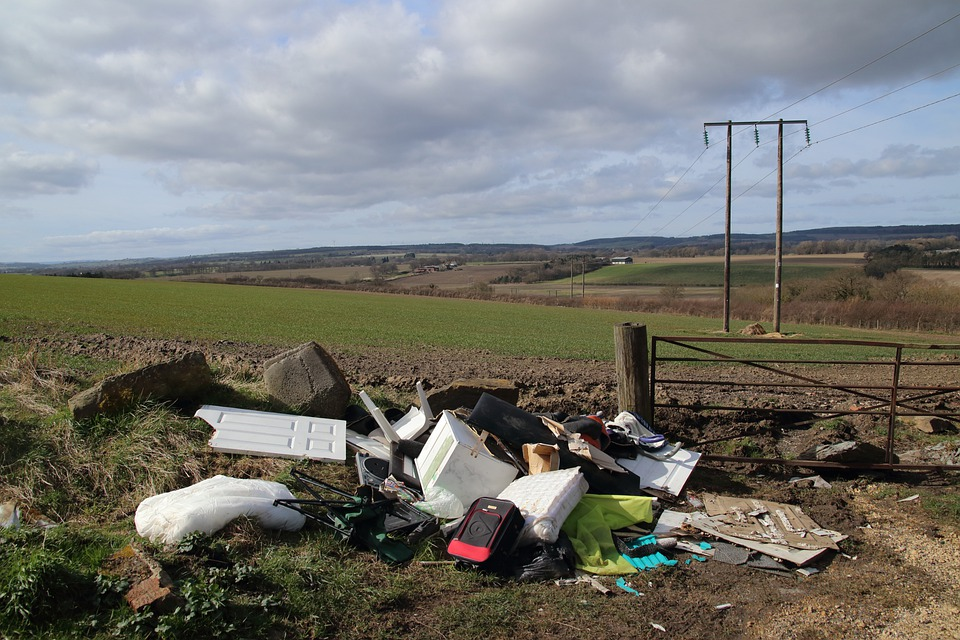Fly tipping is one of the major environmental issues that has been plaguing our society for years. It not only damages the environment but also poses a threat to public health and safety. Unfortunately, many people still engage in this illegal activity despite its negative consequences. In this blog post, we will discuss what fly-tipping is, why it’s a serious offence, who is responsible for it and how it can be prevented. We’ll also delve into the legal consequences of fly-tipping that offenders may face if caught by authorities. So read on to learn more about this pressing issue and how you can help combat it!
What is fly tipping?
Fly tipping, also known as illegal dumping, is disposing of waste in an unauthorized area. This includes leaving rubbish or unwanted items on public or private land, such as abandoned buildings, parks and roadsides. It can range from a small bag of household waste to large amounts of hazardous materials.
This activity causes environmental damage and poses health hazards to humans and animals alike. In addition, the waste dumped may leak harmful chemicals into the soil and water, causing contamination that could last for years.
Unfortunately, fly-tipping remains a common practice due to improper disposal options for people who refuse to follow legal channels. Therefore, it’s important to understand that this illegal activity should be avoided at all costs, and appropriate measures must be taken instead.
Thankfully, we can help combat this issue in various ways, including reporting any fly-tipping you see in your community while properly disposing of our waste using authorized channels provided by local authorities.
The Legal consequences of fly-tipping
Fly-tipping is not only illegal but also has severe consequences. Firstly, fly-tipping poses a significant environmental and human health risk. Dumping hazardous waste materials like asbestos, chemicals, or even electronics can contaminate soil, air and water sources leading to respiratory illnesses, cancer or other diseases. Moreover, rubbish on roadsides or open fields attracts rats and other pests that transmit harmful diseases.
Secondly, local councils bear the cost of cleaning up dumped items, which could cost millions annually. The funds used for this task could have been utilized in providing essential public services such as schools or hospitals.
Thirdly, individuals caught fly-tipping may face hefty fines ranging from hundreds to thousands of dollars, depending on the severity of their actions. This may include court appearances that could tarnish their reputation among employers and society.
Persistent offenders are liable for imprisonment sentences if found guilty repeatedly under section 33(1)(a) Environmental Protection Act 1990.
It is crucial to understand that fly-tipping damages more than just our surroundings; it affects everyone’s well-being in many ways.
Who is responsible for fly-tipping?
Fly-tipping is a serious issue that affects both urban and rural areas. It’s an illegal activity that can cause environmental damage, health hazards, and financial costs to society. But who is responsible for fly-tipping? The answer may be more complex than you think.
Firstly, the person who carries out the act of fly-tipping is ultimately responsible for their actions. This is because they are breaking the law by illegally dumping waste or unwanted items on public or private land without permission. However, identifying the culprit can be difficult if they do it anonymously.
Secondly, those who produce waste must dispose of it properly. This includes individuals and businesses alike. For example, if someone hires a contractor to dispose of their waste but fails to verify that they’re licensed and authorized, they could also be held accountable for any resulting fly-tipping activities.
Thirdly, local authorities have a duty under the Environmental Protection Act 1990 to keep public spaces clean and free from littering or dumping. They must take reasonable steps to prevent fly-tipping in their jurisdiction through education campaigns or enforcement efforts such as surveillance cameras and prosecutions.
In summary, there isn’t just one party responsible for fly-tipping; rather, it’s a shared responsibility between individuals who dump illegally, waste producers who don’t dispose of their trash correctly, and local authorities tasked with keeping our communities clean.
How to prevent fly tipping?
Several measures can be taken to prevent fly-tipping. Firstly, it is important to properly dispose of waste by using designated bins and recycling centres. This reduces the likelihood of waste accumulating in public areas and thus becoming a target for fly-tippers.
Another way to prevent fly-tipping is through community education campaigns. These can educate people on the negative impact of fly-tipping on their environment and encourage them to report any suspicious activity they witness.
Governments should also provide adequate facilities for waste disposal, such as easy access points for rubbish collection or special pickup services for bulky items like furniture or appliances.
Penalties should be imposed on those caught engaging in this illegal activity to deter others who might contemplate doing so.
Enforcement agencies must maintain a visible presence within communities with frequent patrols around known dumping hotspots. This will convey that anyone tempted into flouting environmental regulations will face severe legal consequences.
Conclusion
Fly-tipping is a serious offence that can have significant legal consequences. Not only is it harmful to the environment and public health, but it also undermines efforts to maintain clean communities.
Those who engage in fly-tipping may face hefty fines and even imprisonment if found guilty. In addition, property owners who allow fly-tipping on their land could also face prosecution.
To prevent this illegal activity from occurring, we must all take responsibility for our waste disposal practices and encourage others to do the same. This includes using appropriate waste management services such as local recycling centres or hiring licensed waste removal companies.
Ultimately, preventing fly-tipping requires a collective effort by everyone in society. By working together, we can preserve our environment and protect ourselves from the potential legal repercussions of criminal activities like fly-tipping.

